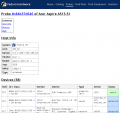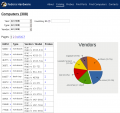(→Usage) |
(Instructions for EL) |
||
| Line 12: | Line 12: | ||
# dnf install hw-probe | # dnf install hw-probe | ||
For RHEL/CentOS version 6 and 7 the package is available as well in the EPEL repository | For RHEL/CentOS version 6 and 7 the package is available as well in the EPEL repository: | ||
# yum install epel-release | |||
== Usage == | == Usage == | ||
Revision as of 18:26, 12 October 2019
About
Check hardware devices operability, collect logs and find drivers.
The Fedora Hardware Database is automatically created based on hardware probes collected by this RPM package or by this flatpak.
It is a part of the global Linux Hardware Database, the successor of Smolt project. The database is mirrored to a Github repository for statistical analysis by third parties.
Installation
# dnf install hw-probe
For RHEL/CentOS version 6 and 7 the package is available as well in the EPEL repository:
# yum install epel-release
Usage
Submit your hardware:
# hw-probe -all -upload
Output:
Probe for hardware ... Ok Reading logs ... Ok Uploaded to DB, Thank you! Probe URL: https://linux-hardware.org/?probe=c84b37d646
Decode ACPI tables (requires acpica-tools package):
# hw-probe -all -upload -decode-acpi
Perform simple graphics tests (requires mesa-demos package):
# hw-probe -all -upload -check
Import created probes to a local directory:
# hw-probe -import ./Directory_to_save_index
Reports backup
All collected reports are anonymized and dumped to this Github repository: https://github.com/linuxhw/
Statistics
By creating a hardware probe you contribute to the "HDD/SSD Real-Life Reliability Test" and "Devices with poor Linux-compatibility" studies.
Privacy
Private info is not collected. See privacy notes.



